Figure Skating Ice Dance
In Sochi, this event was Exhibit A for the alleged rigging that complemented Russia’s state-sponsored doping program. Except that the United States reportedly colluded with Russia:
According to L’Équipe, which quoted an unnamed Russian coach, the United States intended to help Russia win the overall team event and the pairs competition. In return, Russia would make sure the Americans Charlie White and Meryl Davis won the Ice Dancing competition.
(New York Times, February 8, 2014)
Perhaps this was a trial run for the more infamous collusion that so undermined the 2016 presidential election in the United States. No doubt the success they had in Sochi would have been encouraging; after all, each event played out exactly as alleged in that L’Équipe report.
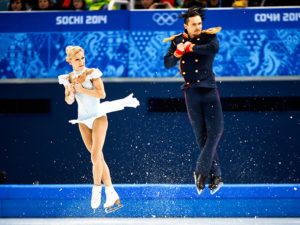 But I contended back then that the Russians performed well enough in the Team Event and Pairs to win gold, and that the Americans did the same in Ice Dancing. But I could hardly blame Canadians for thinking the fix was in, particularly with respect to the Ice Dancing competition.
But I contended back then that the Russians performed well enough in the Team Event and Pairs to win gold, and that the Americans did the same in Ice Dancing. But I could hardly blame Canadians for thinking the fix was in, particularly with respect to the Ice Dancing competition.
Here, for example, is the imperious way columnist Rosie DiManno propagated this conspiracy in the Toronto Star on February 16, 2014 (i.e., before ice dancers competed in the long performances for gold on the 17th):
The villainy of Ice Dancing knows no bounds. If the fix is not in against [Canadian pair] Tessa Virtue and Scott Moir, then I’m the Princess of Wales.
DiManno is no princess. But that does not mean the fix was in.
Mind you, unlike judging Pairs – with its tricky jumps, twists and twirls that clearly separate the wheat from the chaff, judging Ice Dancing is rather like judging beauty: it’s in the eye of the beholder. Not to mention the curiously incestuous relationship among the teams, which added an even more intriguing dimension to this alleged collusion. Here in part is how I commented in “Sochi Olympics: Day 11,” February 18, 2014.
____________________
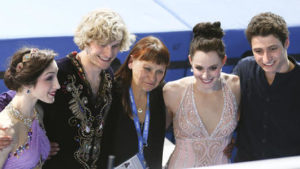 The far more intriguing aspect of this competition was the incestuous nature of the relationship between the teams from Canada and the United States. It’s curious enough that they both trained for these Games at the same skating center just outside Detroit, Michigan; but training with the same coach … who happens to be Russian?!
The far more intriguing aspect of this competition was the incestuous nature of the relationship between the teams from Canada and the United States. It’s curious enough that they both trained for these Games at the same skating center just outside Detroit, Michigan; but training with the same coach … who happens to be Russian?!
Hell, if the fix were truly in, you could be forgiven for thinking that the ice dancers themselves were wholly complicit. Especially when you consider that they merely switched positions from the 2010 Vancouver Olympics, where Canadians Virtue and Moir won gold and Americans Davis and White, silver. Perhaps this is why the only Canadians not complaining about Team Canada getting robbed last night are the Canadian ice dancers themselves.
____________________
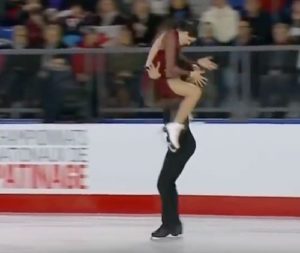 Given that, what are we to make of the same Canadian pair who won in Vancouver, got “robbed” in Sochi, now winning again in PyeongChang?
Given that, what are we to make of the same Canadian pair who won in Vancouver, got “robbed” in Sochi, now winning again in PyeongChang?
In a performance by turns athletic, sensual and expressive, the nonpareil Canadian ice dancing team of Tessa Virtue and Scott Moir reclaimed the Olympic gold medal.
Somewhat surprisingly, the judges very slightly preferred the free dance of Gabriella Papadakis and Guillaume Cizeron of France. But the Canadians’ edge in the short program made the difference.
(New York Times, February 20, 2018)
- Tessa Virtue and Scott Moir of Canada won gold; Gabriella Papadakis and Guillaume Cizeron of France, silver; and Maria Shibutani and Alex Shibutani of the United States, bronze.
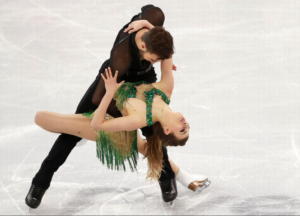 To be fair, there was no hint of any Sochi-style rigging in this event. In fact, I saw first-hand why the short program made the difference. Mere seconds into theirs, the French pair suffered a Jackson and Timberlake-like wardrobe malfunction. Even I knew immediately that ended their shot at gold.
To be fair, there was no hint of any Sochi-style rigging in this event. In fact, I saw first-hand why the short program made the difference. Mere seconds into theirs, the French pair suffered a Jackson and Timberlake-like wardrobe malfunction. Even I knew immediately that ended their shot at gold.
No doubt they earned sympathy points for skating on despite her exposure. But, as soon as they stepped off the ice, they made clear they knew gold was lost.
‘It was kind of … in our thoughts all along the program a little bit,’ said Cizeron, who handled most of the questions in a post-event media session. ‘When you rotate, it’s kind of hard to keep your dress on when it’s open.’
(Washington Post, February 19, 2018)
Frankly, they were lucky to win silver. Because brother and sister Alex and Maria Shibutani for Team USA (a.k.a. “Shib Sibs”) gave them more than enough competition. But, talk about incestuous relationships.
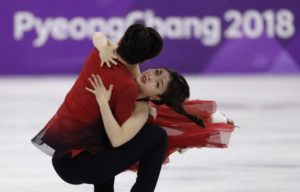 I honestly had a difficult time appreciating their “athletic, sensual and expressive” performance. Granted, it did not include the explicit simulation of cunnilingus Virtue and Moir performed. But it was sexy enough to raise eyebrows.
I honestly had a difficult time appreciating their “athletic, sensual and expressive” performance. Granted, it did not include the explicit simulation of cunnilingus Virtue and Moir performed. But it was sexy enough to raise eyebrows.
When I was his age, I could never even imagine performing anything so intimately with any of my sisters. Which makes it all the more remarkable that these siblings sell unbridled intimacy so convincingly.
But who knew Olympic Ice Dancing had all the intrigue of a John le Carré novel, eh?
MEDAL COUNT: Norway 29; Germany 23; and Canada 19
Related commentaries:
Day 1-10…
Sochi Day 11…